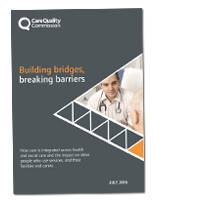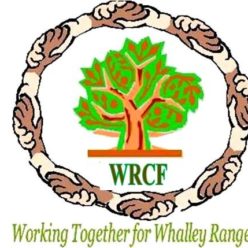Building bridges, breaking barriers looks at how well care for older people is integrated across health and social care, as well as the impact on older people who use services and their families and carers.

The review seeks to improve our understanding of how services work together to meet the needs of older people.
What we did
We gathered evidence from a range of sources, undertook site visits and spoke with older people and their carers to understand how integration across services affected their experiences of care. We looked for examples of where care was coordinated effectively and identified barriers that prevent it from working well.
What we found
We found many initiatives aimed at delivering integrated care. We saw some good practice, and in many cases considerable drive from providers and commissioners to improve the way services work together, but we did not find many examples of it working really well. There was considerable variation in the care provided and in the experiences and outcomes for older people.
Across the eight sites we reviewed, our findings related to both how services were working together and the impact this has on older people’s experiences. Looking at how services were working together for older people, we found that:
- There was widespread commitment to delivering integrated care.
- There were still many organisational barriers that made it difficult for services to identify older people who were at risk of deterioration or an unplanned emergency admission to hospital.
- There were examples of joint working in delivering health and social care, but these were often inconsistent, short-term and reliant on partial or temporary funding and goodwill between different providers. They were not a mainstream part of the way in which services were planned or delivered around older people.
- Monitoring and evaluation was often not carried out locally or was insufficient.
- The lack of connection between services often resulted in older people and their families or carers needing to take responsibility for navigating complex local services. This could result in people ‘falling through the gaps’ and only being identified in response to a crisis.
- Older people often had multiple care plans because professionals did not routinely link together and share information.
- Older people were not routinely involved in decision making about their needs and preferences.
- Older people and their families or carers did not routinely receive clear information about how their health and social care would be coordinated, in particular if there were changes in their circumstances or if there was an unplanned or emergency admission to hospital.
- Local leaders achieved integrated person-centred care by working closely across health and social care services to share information, reduce duplicated efforts and use resources more effectively.
Our recommendations
- Health and social care leaders should develop and agree a shared understanding and definition of what integrated care means for the population in their local area, and then work towards delivering this shared aim.
- NHS England and Association of Directors of Adult Social Services (ADASS) should lead on developing an agreed methodology and data set for identifying people at risk of admission to secondary care or deterioration.
- Older people should be meaningfully involved in making informed decisions about their care needs and care planning – in particular about the outcomes that are important to them – based on the existing national and local guidance.
- Commissioners and providers in an area should ensure that information and support for older people and their families or carers is available, and this sets out connections between services, and how the people’s accessibility needs will be met.
- The National Quality Board, in partnership with the National Information Board, develop and share a set of validated data metrics and outcomes measures for integrated care with person-centred outcomes at the heart of decision making about service provision and based on a consistent, shared view and definition of integration.





